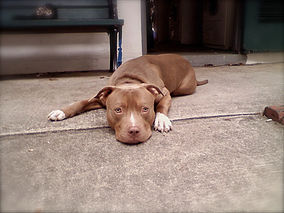Kennel cough is a common contagious illness that develops in dogs that have been mingling with other infected animals. This can occur through boarding, grooming, dog parks, pet stores, family gatherings or nose-to-nose contact while out on walks through the neighborhood.
Causes of kennel cough can include both viruses and bacteria. Commonly, more than one agent is involved in an infection. Infections with the following organisms have been implicated in creating kennel cough:
- Bordetella bronchiseptica (bacteria)
- Parainfluenza virus
- Adenovirus type 2
- Canine distemper virus
- Canine influenza virus
- Canine herpes virus
- Mycoplasma canis (a single cell organism that is neither virus nor bacteria)
The main symptom of kennel cough is a hacking cough. Pet owners will often describe this cough as sounding like “something is stuck in the throat.” Occasionally fever, sneezing, nasal or ocular discharge can also be seen. The incubation period (the time from exposure to clinical signs) is 2-14 days. Dogs are typically sick for 1-2 weeks and infected dogs can shed kennel cough organisms for 2-3 months after infection. In complicated cases, or in pets with compromised airways, pneumonia may result.
The diagnosis of kennel cough is typically made based on history of exposure to other dogs within the proper timeframe, plus typical exam findings of a coughing dog that is otherwise feeling well is adequate to make the diagnosis. (Source: VeterinaryPartner.com). Radiographs can be helpful to show signs of bronchitis or pneumonia in complicated cases.
Treatment involves antibiotics and occasionally cough suppressants. Warm humid air therapy (by using humidifiers or allowing pets to sit in a bathroom while a warm shower is running) can also be used in helping a pet clear their airways.
Vaccines are available to help protect against kennel cough, however the vaccines are not expected to completely eliminate the risk of infection. Vaccinated dogs generally have milder symptoms than unvaccinated dogs. Any dogs with lifestyles that predispose them to infection (grooming, boarding, training groups, dog parks, daycare, etc.) are strongly advised to receive regular vaccinations to help reduce their risk.

